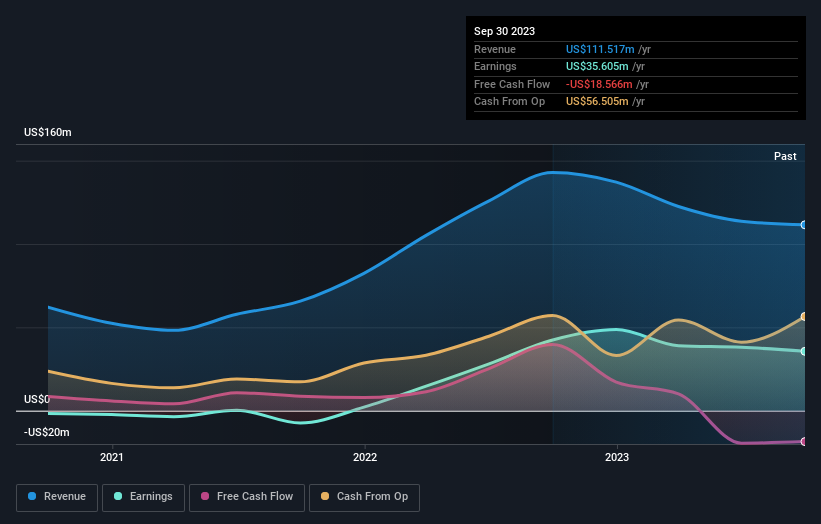In spite of recent selling, insiders still have the largest holding in PrimeEnergy Resources Corporation (NASDAQ:PNRG) with a 62% ownership
Key Insights
Insiders appear to have a vested interest in PrimeEnergy Resources' growth, as seen by their sizeable ownership
A total of 3 investors have a majority stake in the company with 55% ownership
If you want to know who really controls PrimeEnergy Resources Corporation (NASDAQ:PNRG), then you'll have to look at the makeup of its share registry. And the group that holds the biggest piece of the pie are individual insiders with 62% ownership. In other words, the group stands to gain the most (or lose the most) from their investment into the company.
Despite selling some shares recently, insiders control a good portion of the company's stock.
Let's take a closer look to see what the different types of shareholders can tell us about PrimeEnergy Resources.
See our latest analysis for PrimeEnergy Resources
What Does The Institutional Ownership Tell Us About PrimeEnergy Resources?
Many institutions measure their performance against an index that approximates the local market. So they usually pay more attention to companies that are included in major indices.
PrimeEnergy Resources already has institutions on the share registry. Indeed, they own a respectable stake in the company. This implies the analysts working for those institutions have looked at the stock and they like it. But just like anyone else, they could be wrong. It is not uncommon to see a big share price drop if two large institutional investors try to sell out of a stock at the same time. So it is worth checking the past earnings trajectory of PrimeEnergy Resources, (below). Of course, keep in mind that there are other factors to consider, too.
PrimeEnergy Resources is not owned by hedge funds. Looking at our data, we can see that the largest shareholder is the CEO Charles Drimal with 29% of shares outstanding. Robert de Rothschild is the second largest shareholder owning 17% of common stock, and Clint Hurt & Associates, Inc. holds about 8.6% of the company stock.
To make our study more interesting, we found that the top 3 shareholders have a majority ownership in the company, meaning that they are powerful enough to influence the decisions of the company.
While studying institutional ownership for a company can add value to your research, it is also a good practice to research analyst recommendations to get a deeper understand of a stock's expected performance. We're not picking up on any analyst coverage of the stock at the moment, so the company is unlikely to be widely held.
Insider Ownership Of PrimeEnergy Resources
The definition of company insiders can be subjective and does vary between jurisdictions. Our data reflects individual insiders, capturing board members at the very least. Management ultimately answers to the board. However, it is not uncommon for managers to be executive board members, especially if they are a founder or the CEO.
Most consider insider ownership a positive because it can indicate the board is well aligned with other shareholders. However, on some occasions too much power is concentrated within this group.
Our information suggests that insiders own more than half of PrimeEnergy Resources Corporation. This gives them effective control of the company. That means they own US$105m worth of shares in the US$170m company. That's quite meaningful. Most would argue this is a positive, showing strong alignment with shareholders. You can click here to see if those insiders have been buying or selling.
General Public Ownership
The general public-- including retail investors -- own 18% stake in the company, and hence can't easily be ignored. While this group can't necessarily call the shots, it can certainly have a real influence on how the company is run.
Private Company Ownership
It seems that Private Companies own 8.6%, of the PrimeEnergy Resources stock. It's hard to draw any conclusions from this fact alone, so its worth looking into who owns those private companies. Sometimes insiders or other related parties have an interest in shares in a public company through a separate private company.
Next Steps:
While it is well worth considering the different groups that own a company, there are other factors that are even more important. Case in point: We've spotted 2 warning signs for PrimeEnergy Resources you should be aware of, and 1 of them shouldn't be ignored.
If you would prefer check out another company -- one with potentially superior financials -- then do not miss this free list of interesting companies, backed by strong financial data.
NB: Figures in this article are calculated using data from the last twelve months, which refer to the 12-month period ending on the last date of the month the financial statement is dated. This may not be consistent with full year annual report figures.
Have feedback on this article? Concerned about the content? Get in touch with us directly. Alternatively, email editorial-team (at) simplywallst.com.
This article by Simply Wall St is general in nature. We provide commentary based on historical data and analyst forecasts only using an unbiased methodology and our articles are not intended to be financial advice. It does not constitute a recommendation to buy or sell any stock, and does not take account of your objectives, or your financial situation. We aim to bring you long-term focused analysis driven by fundamental data. Note that our analysis may not factor in the latest price-sensitive company announcements or qualitative material. Simply Wall St has no position in any stocks mentioned.


